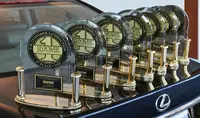Shoppers Cite Dealer-Related Issues Among Top Reasons for Rejecting a New Vehicle
 |
WESTLAKE VILLAGE, Calif., Sept. 24, 2008 - A majority of vehicles are rejected only after a new-vehicle shopper has visited a dealership, according to the J.D. Power and Associates 2008 Escaped Shopper Study(SM) released today.
The study, which analyzes the reasons why consumers consider a model but ultimately purchase a different make or model, finds that 80 percent of vehicles are rejected after a new-vehicle shopper has visited a dealership. Three dealer-related issues are among the top reasons for not purchasing a vehicle: another dealer has better service; limited availability of the specific vehicle shoppers are looking for on dealer lots; and lack of professionalism among personnel at the dealership.
"Given today's challenging automotive market, both sales and service experiences at the dealership are particularly critical in the decision-making process of shoppers," said Tom Gauer, senior director of automotive retail research at J.D. Power and Associates. "Sales personnel can play a key role in improving close rates by viewing customer visits as an opportunity to demonstrate a vehicle's value and by successfully matching shoppers with the new vehicle that best suits their needs."
The study also finds that an increasing number of shoppers have considered buying an Asian brand -- 63 percent in 2008, up from 60 percent in 2007. Conversely, the proportion of shoppers who considered buying a domestic brand has decreased -- down to 55 percent in 2008 from 58 percent in 2007. Shoppers who cross-shop among Asian and domestic brands are more likely to purchase an Asian brand and most often cite retained value, reliability and gas mileage as primary reasons for their choice. In contrast, those customers who purchase a domestic brand instead of an Asian brand most commonly cite a desire to "buy American" as their primary reason for purchase, followed by rebates and incentives offered, and vehicle price.
"As shoppers move away from larger-vehicle segments in growing numbers, domestic manufacturers -- more so than Asian and European manufacturers -- must focus on rapidly aligning their U.S. product portfolios with this shift in consumer preferences," said Gauer.
The percentage of shoppers who cite gas mileage as a reason for rejecting a vehicle has increased in 2008-up to nearly 20 percent this year from nearly 17 percent in 2007. Unsatisfactory gas mileage is the third-most-common reason to reject a vehicle, with particularly high rates of rejection in the large, midsize and compact utility vehicle segments.
Nearly 40 percent of all new-vehicle shoppers cite price as the most influential reason for not purchasing a vehicle. Additionally, nearly one-half of shoppers 40 years of age and younger reject vehicles based on price- or finance-related issues. In contrast, only one in three shoppers who are 60 years of age or older reject vehicles for the same reasons.
"Interestingly, nearly 40 percent of all shoppers who reject a vehicle because of price say they can afford the vehicle, but don't believe the vehicle is worth the price," said Gauer. "This presents an opportunity for dealership personnel to focus on demonstrating the different features contributing to the vehicle's total value to these shoppers, which can eventually lead to increases in close rates."
The 2008 Escaped Shopper Study is based on responses from 29,903 new-vehicle buyers surveyed between May and July 2008.


